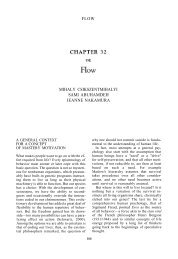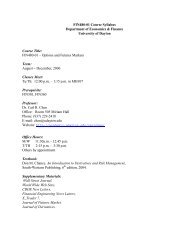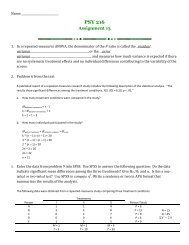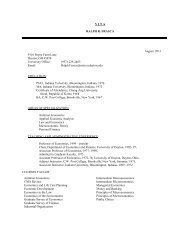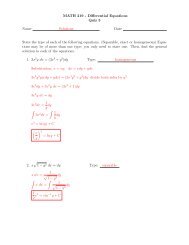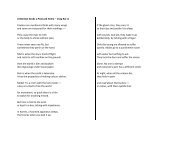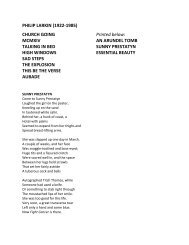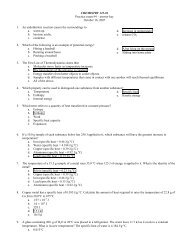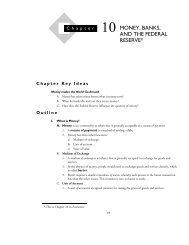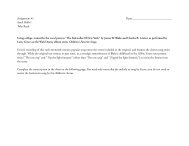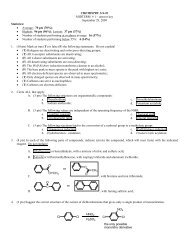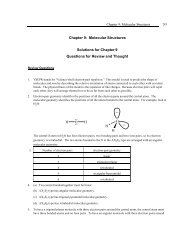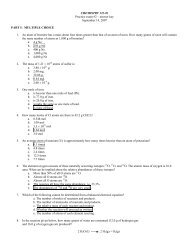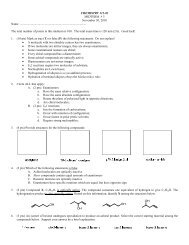Research Expectation Associated with my Lab - University of Dayton ...
Research Expectation Associated with my Lab - University of Dayton ...
Research Expectation Associated with my Lab - University of Dayton ...
Create successful ePaper yourself
Turn your PDF publications into a flip-book with our unique Google optimized e-Paper software.
Undergraduate <strong>Research</strong> Prospectus<br />
Dr. Ryan McEwan<br />
<strong>Lab</strong>oratory <strong>of</strong> Environmental Ecology<br />
Undergraduate research is a key component <strong>of</strong> <strong>my</strong> laboratory. The work<br />
environment in the <strong>Lab</strong> is supportive <strong>of</strong> the development <strong>of</strong> intellectual and practical<br />
capabilities for students. Although students <strong>of</strong>ten begin by assisting <strong>with</strong> general lab<br />
tasks, the goal is to provide a pathway for the individual toward assuming a leadership<br />
role in every piece <strong>of</strong> the scientific process- experimental design, grant writing, data<br />
collection, data analysis, manuscript writing, and presenting.<br />
Those who join the lab must be willing to commit themselves to the <strong>Lab</strong> community. In<br />
particular, I have these expectations for every <strong>Lab</strong> member:<br />
1) Attend ~weekly lab meetings during the academic year. We usually meet once a<br />
week to discuss our ongoing projects, to read & critique each other’s work, to talk about<br />
pr<strong>of</strong>essional development, etc. We <strong>of</strong>ten read from the primary literature together. We<br />
can also problem solve as a group, and take trips to field sites. I generally alternate the<br />
role <strong>of</strong> organizer <strong>with</strong> one <strong>of</strong> the graduate students.<br />
2) Everyone in the <strong>Lab</strong> should attend pertinent campus events. In particular lab<br />
members should attend lectures on campus that are ecological/environmental in nature.<br />
I prefer if students in the lab attend all <strong>of</strong> the Biology seminars, and this is required for<br />
graduate students.<br />
3) As a lab, we usually host 1 invited speaker/semester who is a scientist from outside<br />
UD. I like for the lab members to interact <strong>with</strong> that person in some regard.<br />
4) I expect students conducting research in the <strong>Lab</strong> to do high quality work that is<br />
worthy <strong>of</strong> pr<strong>of</strong>essional presentations and, ultimately, publication. This means rigorously<br />
designing the research, careful execution, data collection and analysis, and pursuit <strong>of</strong><br />
the manuscript through the publication process. I also strongly encourage pr<strong>of</strong>essional<br />
presentation. Each year I expect most everyone in the lab to present at the Ecological<br />
Society <strong>of</strong> America conference and we may also attend other regional conferences as a<br />
group. I view communicating our research to be a crucial step in the scientific method,<br />
and a critical developmental opportunity for students.
5) I commit <strong>my</strong>self to pr<strong>of</strong>essional development for folks in the lab, and I want to be<br />
involved in this process. Although I totally understand and support a student who might<br />
change their minds about career options- I do not work <strong>with</strong> students who a priori simply<br />
want "a lab experience." I want students in the lab to be involved in this work because it<br />
is a life passion. I view student experience in <strong>my</strong> lab as just the first step down the path<br />
toward a career. To be honest, I do not accept everyone who applies to work <strong>with</strong> me,<br />
and the selection process has a whole lot to do <strong>with</strong> whether I think the person is<br />
serious about moving beyond UD toward an impactful life in Environmental Ecology<br />
(broadly construed).<br />
6) The challenge for me as your research advisor is to help you carve a piece <strong>of</strong><br />
research/scholarship out <strong>of</strong> your interests that also fits <strong>with</strong>in the broader lab mission <strong>of</strong><br />
the <strong>Lab</strong>. This will involve helping you put together the skill set, and connections,<br />
needed for you to accomplish the research, while also keeping an eye on the long-term,<br />
where do you want to go after UD, and what steps do you need to take now to get you<br />
there.<br />
Undergraduates in <strong>my</strong> <strong>Lab</strong> generally move through a systematic progression as<br />
described below- although each case is unique and exceptions are common. Over the<br />
course <strong>of</strong> their time at UD, undergraduates in <strong>my</strong> lab have the opportunity to work<br />
through the following four employment categories. These are divided up roughly in<br />
association <strong>with</strong> the categories <strong>of</strong> undergraduate development (Freshman-Senior)<br />
although there are many ways in which this system might not match individual<br />
circumstances.<br />
Support Technician (entry-level, <strong>of</strong>ten Freshman or Sophmores)<br />
These are volunteer positions, usually ~5 hrs/week. The work associated <strong>with</strong><br />
this position is generally basic- sampling processing, data entry, some microscope work<br />
<strong>with</strong> tree-ring samples, etc. In this position you are expected to meet whatever need we<br />
might have in the lab. You should be flexible and willing/eager to learn.<br />
Undergraduates who are serving as a technician in <strong>my</strong> lab must:<br />
1) Be punctual and responsible about appointments and work hours.<br />
2) Be extremely diligent about data collection and following procedures.<br />
3) Be responsible and respectful <strong>with</strong> lab gear and facilities.<br />
4) Have a positive attitude. Negativity or disrespect toward lab members will not be<br />
tolerated.
Technicians (mostly Sophmores)<br />
These are paid positions, usually 7$/hr; 5-10 hrs/week. There are more<br />
interested students than positions, so getting into these slots is seniority based and<br />
competitive. This is step up in responsibility from the Support Tech position. Students<br />
in this position will be trusted <strong>with</strong> more complex tasks and analyses. When<br />
appropriate, these positions could include full-time employment during the summer<br />
break. Students in these positions generally are poised to start thinking about research<br />
projects that they could participate in more <strong>of</strong> a leadership role. Students in these<br />
positions are expected to comply <strong>with</strong> 1-4 above, and:<br />
5) Be willing (and able) to take on more complex scientific tasks.<br />
6) Begin familiarizing themselves <strong>with</strong> both the operational aspects <strong>of</strong> field/lab tasks,<br />
but also the reasons for using them.<br />
7) Work independently, <strong>with</strong>out supervision, effectively.<br />
8) Instruct students <strong>with</strong> less experience<br />
<strong>Research</strong> Associate (mostly Juniors)<br />
These are more advanced position. Students may be paid in these positions,<br />
may use these activities for independent study credits, or both. They are a step up in<br />
responsibility from the Technician position. In these positions, students are taking on<br />
large sub-sections <strong>of</strong> research projects. They are seeing field/lab tasks through to<br />
completion, collecting AND beginning to analyze data. These students should begin<br />
reading scientific literature. A student in this position will begin writing small grants and<br />
may present research at the Stander Symposium or other local meetings. These<br />
students may also begin engaging <strong>with</strong> regional natural areas managers. In addition to<br />
1-8 above, these students will:<br />
9) Take a leadership role <strong>with</strong> their research.<br />
10) Be willing to problem solve.<br />
11) Work all the way through the scientific method, including preparing a final report <strong>of</strong><br />
their findings and presenting at Stander.<br />
Prior to graduation the student must:<br />
• Prepare a final document or report- in most cases this will take the form <strong>of</strong> a scientific<br />
paper.<br />
• Present their research at an on campus event. In the best case, presentation <strong>of</strong>f<br />
campus at a regional or national meeting will also occur.
Project Leader (Mostly Seniors)<br />
These are the most advanced position in the lab. The student is expected to<br />
meet most <strong>of</strong> the tasks associated <strong>with</strong> being a graduate student. A Project Leader<br />
takes the initiative <strong>with</strong> a project, helps develop a research vision and pursues that<br />
vision. A Project Leader develops timelines, collects data, processes data, analyzes<br />
data, and vigorously pursues presenting a regional or national meetings and publishing<br />
in a peer-reviewed journal. Very <strong>of</strong>ten a Project Leader will have undergraduates (e.g.,<br />
Support Technicians) who they direct on their project. Students in this position are<br />
expected to interact at the level <strong>of</strong> a dedicated scientist, and may be invited (by the PI)<br />
to functions usually reserved for only Graduate Students. In fact, this position in the lab<br />
is only slightly removed from the level <strong>of</strong> expectation I have for a Master’s Degree<br />
student. Ascension to such a position will usually involve working through the various<br />
other levels successfully (a multi-year process). A student in this position will be<br />
perfectly position to move into graduate school or become a pr<strong>of</strong>essional ecologist.<br />
Norris Guidelines for Undergraduate <strong>Research</strong> Projects<br />
One <strong>of</strong> the biggest challenges <strong>of</strong> completing a research project in Environmental<br />
Ecology is properly budgeting time for analysis and writing. These come at the end <strong>of</strong><br />
the process and the time commitment needed to bring the project to completion properly<br />
is <strong>of</strong>ten vastly underestimated. Here are guidelines for research projects in <strong>my</strong> lab:<br />
During the final year <strong>of</strong> the project I expect:<br />
- All initial data analysis to be completed, and turned in, by November 1 st . This<br />
includes the creation <strong>of</strong> maps, graphs, and statistical analyses.<br />
- A completed draft <strong>of</strong> the final manuscript must be completed, and turned in, by<br />
March 1st <strong>of</strong> the final year. The remainder <strong>of</strong> the semester will be spent editing<br />
and sharpening the manuscript.<br />
- Allocation <strong>of</strong> Thesis/<strong>Research</strong> credits should emphasize or match, the writing<br />
process. Thus, should be heaviest in the spring semester. It is best to minimize<br />
other courses in the spring so that focused attention can be given to completing<br />
the project.<br />
Ryan W. McEwan, PhD<br />
Department <strong>of</strong> Biology<br />
The <strong>University</strong> <strong>of</strong> <strong>Dayton</strong>, 300 College Park<br />
<strong>Dayton</strong>, OH 45469-2320<br />
Office phone: 1.937.229.2558<br />
Office Location: 223D Sherman Hall<br />
Email: ryan.mcewan@udayton.edu<br />
<strong>Lab</strong>: http://academic.udayton.edu/ryanmcewan



